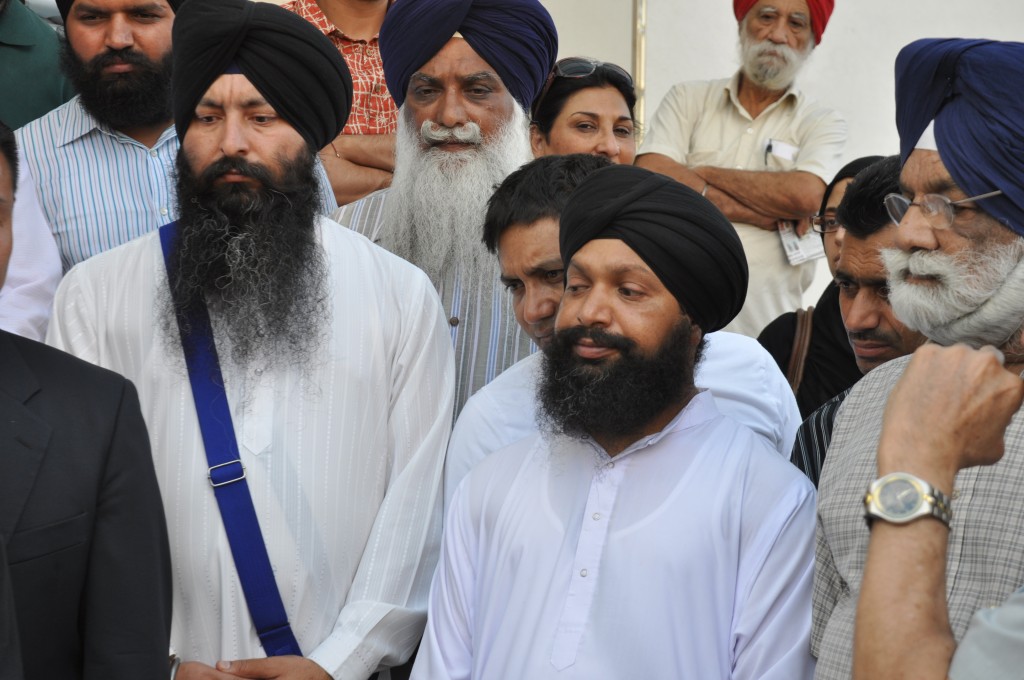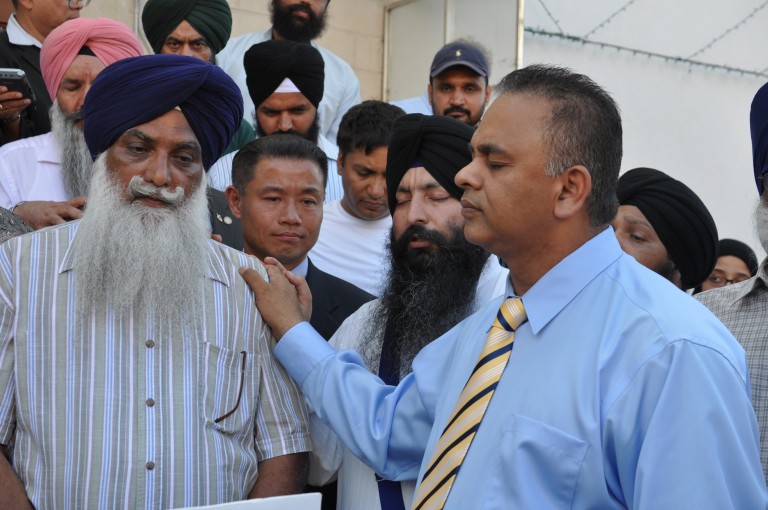
Members of the Richmond Hill gurdwara gathered Monday to offer prayers and receive support from elected officials. Richmond Hill is home to the largest concentration of Sikhs in New York City. Forum Newsgroup photo by Luis Gronda.
Surrounded by a congregation of colorful turbans and saddened faces, Mayor Michael Bloomberg condemned the Sunday massacre of six Sikh worshipers at a Wisconsin temple. At a press conference at the Richmond Hill Sikh Cultural Society and temple on Monday, he promised to stand in solidarity with the affected local community.
“No matter who you are, no matter where you’re from, no matter what religion you profess, you have a right to be safe in your homes, in your places of worship and in the streets of New York City,” Bloomberg said. “We have no tolerance for intolerance.”
Authorities believe that a lone gunmen, Wade Michael Page, opened fire on a temple, known as a gurdwara, in Oak Creek. Police forces eventually shot and wounded gunman before he killed himself.
Despite the huge community outpouring and prayers inside the Queens temple, there was not a single person who was able to make sense of the tragedy, including the young.
“It was just a shock. We know there is discrimination, but to actually kill people…” said 13-year-old temple member, Kaur Birjot, who could only finish her sentence by shaking her head.
For one local worshiper, Mohan Singh Khatra, the day carried extra weight as his uncle was among those killed in the shooting spree.
“I am very sad,” said Khatra, who said he had spoken to his kin right before the shooting.
Outside of the temple later in the day, in a moving demonstration of tolerance orchestrated by Councilman Ruben Willis, spiritual leaders representing Islam, Christianity, Hinduism, and Sikhism placed their hands on Khatra and joined in prayers of healing.
Queens, often praised for its multicultural identity, is home to one of the largest concentrations of Sikhs in the United States. Harpreet Singh Toor, a leader of the Cultural Society, estimates the population to be 15,000, with a majority centralized in Richmond Hill, a neighbor- hood housing seven gurdwaras.
Also at the scene of the Richmond Hill gurdwara was a strong police presence as promised by Police Commissioner Ray Kelly, who also offered his sup- port during the press conference. Although Kelly said there is no direct threat to locals in NYC, his forces will proceed with precautions.
“I can assure you that we’re going to continue to monitor this issue; we’re going to keep our presence at these locations in place, and we’re going to make that determination on a daily basis,” Kelly said.
Gurdwara leaders said they have been overwhelmed by warmth and support and welcome the increased security measures. However, many temple worshipers indicated they have been subject to hateful discrimination for years and fear they are not immune from such an incident.
“It most certainly would happen here. We are not safe,” said Satnam Kaur, a 63-year-old temple member who recalled a time when a passerby spit on her face in the street, shouting racial slurs.
Kaur blames this on a lack of cultural awareness and an incomprehensible hatred associated with Muslims, who Sikhs are often mistaken for due to their traditional dress of turbans and long beards.
“What is required is they should know what we look like – what we do – our prayers,” Kaur said.
Although police have still not determined a motive for the Wisconsin shooting, most speculate intentions of a hate crime, and it has been la- beled an act of domestic terrorism by authorities.
“ We are waiting for law enforcement, but what is clear is that Sikhs were targeted as casualties,” said Supreet Kaur, an advisory board member of the Sikh Coalition, the nation’s largest Sikh civil rights organization.
“[The Coalition] started after the backlash the Sikh community experienced after 9/11,” said Kaur. “Our main focus is to combat violent hate crimes, bullying in schools, employment discrimination, and profiling at airports.”
Kaur added that bullying in schools is unfortunately all too common for Sikh children. The Coalition conducted a survey several years ago in which they found that one-third of school boys has been physically assaulted, including forced removal of their turbans.
“At the very least, [we’ve] been subject to name calling. It’s common to the Sikh experience,” said Kaur.
A move that Toor calls for and believes would improve the public understanding of Sikhs is the allowance of an NYPD officer to wear a turban and grow a beard. Sangh says a member of his gurdwara quit the NYPD after not being allowed to wear his traditional head dress.
“If [this acceptance] cannot happen in New York City, where can it happen?” questioned Toor.
Councilman Mark Weprin (D- Oakland Gardens), who along with a slew of other local elected officials, offered his condolences at the gurdwara , said he is sponsoring legislation that would prohibit agencies from making discriminatory uniform decisions.
“There is no reason to choose between religion and doing your job,” said Weprin.
As the Sikh community heals and continues to press for changes in discriminatory policies, they offer an open door invitation to all.
“The community encourages others to come and learn and ask questions. Only through that will we dispel ignorance and prevent this in the future,” said Kaur.
By Katie Riordan
Luis Gronda contributed reporting to this story.

